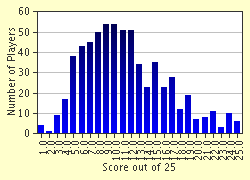Quiz Answer Key and Fun Facts
1. Which of the following languages does not go under the SEMITIC category?
2. Which language puts the definite article ('the') at the end of the noun?
3. Which of the following languages spoken in Europe is NOT part of the Indo-European language family?
4. To which of the following language groups does English belong?
5. Which language is NOT commonly spoken in South Africa?
6. What is the name for the popular form of Ancient Greek which Modern Greek is said to have come from?
7. What does 'hysteria' mean in Greek?
8. Which is not an official language of Switzerland?
9. What is the Korean alphabet called?
10. Which Latin case is said to be "instrumentative"?
11. In what language do people of Russian Orthodox faith pray?
12. From what language is the word 'oasis' said to have originated?
13. Which of the following is not a Slavic language?
14. Which language is believed by some to be the most similar to English?
15. From what language does the word 'taboo' come?
16. Which of the following Indian languages doesn't belong to the Indo-European family?
17. Which of the following is NOT a Romance language?
18. What is the name for the Japanese logographic script based on Chinese characters?
19. How do you say China in Mandarin?
20. According to the Oxford English Dictionary, from what language does the word 'ketchup' come?
21. What is the name for the accent used in Czech and other Slavic languages that looks like an upside down circumflex accent (Like a small v)?
22. In what mood is the phrase 'If I were you'?
23. Which of the following languages is not written in Latin (Roman) script?
24. Which name is not of Hebrew origin?
25. From what language does the word 'bagel' come?
Source: Author
marcgarellek
This quiz was reviewed by FunTrivia editor
bloomsby before going online.
Any errors found in FunTrivia content are routinely corrected through our feedback system.


